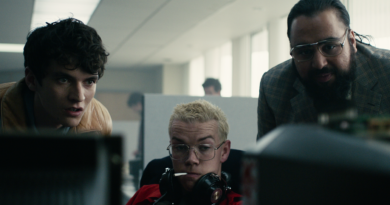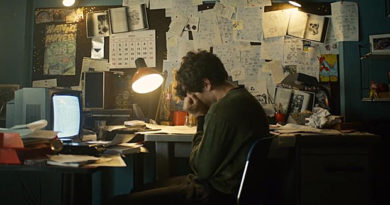Black Mirror Bandersnatch: Multiple Endings Explained
This story contains spoilers for Black Mirror: Bandersnatch, its multiple endings, and alternate paths.
Black Mirror is a program that always pushes our buttons (both figuratively and literally sometimes). It finds creative ways to get under our skin and question not only the technology around us, but the people who make it. Even though the quality of episodes may vary, the series typically succeeds with its morbid looks at what could come of humanity. The series has always found innovative and challenging ways to push the limits of its stories, but the program’s latest experiment, Black Mirror: Bandersnatch is the greatest example of that yet. The series presents an interactive episode that allows viewers to select alternate routes and determine the outcome of the story, but the series also finds a story about free will, predestination, and alternate realities that perfectly represents this kind of “choose your own adventure” structure.
It’s yet another example of Black Mirror truly showing what it’s capable of, and even though this feature length episode will run about 90 minutes for most, there is in fact over 150 minutes of original footage that was filmed for this event installment to cover all of the various possible tangents (which apparently has over 250 segments and a “trillion permutations”). That’s a staggering amount of content and with the cryptic nature of the series, I wouldn’t even be surprised if there’s a super-secret ending that no one will know exists until weeks later. In spite of the episode’s many twists and turns, here’s our attempt to make sense of Black Mirror: Bandersnatch‘s ending—at least the ending that we ended up with.
Bandersnatch looks at Stefan Butler (Fionn Whitehead) and his mission to create his passion project, a “Choose Your Own Adventure” video game titled “Bandersnatch.” As Stefan’s journey continues, his hold on reality begins to increasingly slip and suddenly whether or not he meets his deadline in time is the least of his worries. The various tangents that you can go on through Bandersnatch tease that free will is delusional, and that Stefan’s a pawn used for entertainment by someone in the future, or that he’s even a clinical guinea pig for the government where his entire life is fabricated study. They’re all fascinating routes, but they each all convey that Stefan isn’t in control of the decisions in his life, yet he continues to be tortured because he takes responsibility for these actions. This all roots back to the fact that deep down he still feels responsible for the death of his mother.
read more – Black Mirror: Bandersnatch Review
The death of Stefan’s mother acts like the major linchpin in the story, which makes the ending that feels like the “true” conclusion the one where Stefan chooses to get on the train with her. One route allows Stefan to “time travel” through a mirror back to a pivotal moment in his childhood. You’re presented with the opportunity to alter the events of the past and retrieve your beloved teddy bear that your father has hidden. After such, your mother presents you with the opportunity to ride the train with her, and even though you know the terrible fate that awaits you, you still get on it with her. The decision to end yourself in the past causes your present self to also pass away, which is why a grown-up Stefan suddenly dies in his therapy session. It’s an incredibly bittersweet conclusion, but one that feels authentically in tone with the series. This fate also assures that “Bandersnatch” never sees release because Stefan never grows up to create it. This is all of course contingent on the fact that you follow Colin to do drugs and have your mind opened up in such a fashion.
As much as this ending jives with Black Mirror, there’s another possible conclusion that’s morbid in entirely different ways and adds an extra little surprise at the end. If you choose to eventually butcher your father and make a series of other twisted decisions, “Bandersnatch” will get released and receive a 5/5, but Stefan will be in jail and the game quickly gets pulled from shelves. This scenario features a tag where in the present time, Pearl (Colin’s daughter) pitches to reboot “Bandersnatch” as a film for a popular streaming service (wink, wink). It appears that Pearl is also afflicted by the same “curse” that plagued Stefan as the cycle begins anew. It’s appropriately dark and meta in all of the ways that Black Mirror enjoys to be.
That being said, there’s one conclusion that goes down an extremely meta path that almost feels like a fun “joke ending” that’s thrown in for adventurous viewers. When Stefan asks for a sign in response to what sort of forces are controlling his decisions, you can offer up explanations in the form of the White Bear symbol or PACS. Bandersnatch also lets you give “NETFLIX” as a viable answer to Stefan’s prayers. This path has some fun where you literally get to attempt to explain to someone from the 1980s what a streaming service is, and it’s all delightfully tongue-in-cheek. It doesn’t end there though and when Stefan brings up the concept of Netflix and that there’s someone from the future who controls him, her responses are if she’s trying to sate a bored viewer.
Your therapy session explodes into a bonkers fight scene to “make things more interesting,” but the coup de grace is when you attempt to jump out the window of the therapist’s office. Suddenly a director calls Cut! and the camera pulls out to reveal that this is the production of the episode and that it’s all a film set. When the director refers to Stefan by his actor’s name, he becomes confused and insists that he’s Stefan. The director sends for a set medic, as she becomes worried for the actor’s health and the decisions that he’s making. It is touches like this that are not only fun but also act as brilliant examples of how to properly use this format as cleverly as possible. This ending is as post-modern as it gets.
further reading: How Black Mirror Season 3 is Eerily Coming True
Netflix has stated that there’s five “main” endings out there, so there are even more story threads and alternative finishes that are possible. As fun as it is to figure the various fates that can await Stefan and “Bandersnatch,” the installment wants you to understand that whatever conclusion you get here is inconsequential. “It’s not about the ending. The ending is immaterial. It’s about the decisions you made to get there,” Bandersnatch tells us. It wants the viewer to explore and have fun, which is exactly what this experiment accomplishes.
Now get back in there and find an entirely new way to mess up Stefan’s life. Or don’t. Maybe you’re not even the one responsible for your decision and you’ve got your own “future friend” out there.
Daniel Kurland is a published writer, comedian, and critic whose work can be read on Den of Geek, Vulture, Bloody Disgusting, and ScreenRant. Daniel knows that the owls are not what they seem, that Psycho II is better than the original, and he’s always game to discuss Space Dandy. His perma-neurotic thought process can be followed at @DanielKurlansky.


